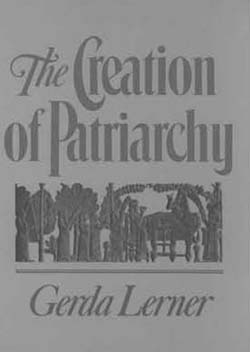When Gerda Lerner’s Creation of Patriarchy appeared, nearly 30 years ago, in a pre-globalized era, middle class, mainly upper caste feminists teaching in colleges in Delhi (and elsewhere) read it avidly, begging, borrowing (but hopefully not doing more than that), and discussing it in the small, intense study circles that dotted the cityscape. Feminism, with a few exceptions, was yet to make inroads into more exalted institutionalized spaces. However, through the next couple of decades, the book was inserted into reading lists for college and university courses, and retains that position in spite of more fashionable contenders.
What made the book challenging and compelling? First, it stemmed from a long-term engagement—fifteen years of asking questions, followed by another eight of intense research (p. vii). Second was the audacity of stepping out of disciplinary boundaries and challenging existing frameworks in posing ‘large questions’ (p. viii). These would prove inspiring, demanding, even exasperating, as feminist scholars attempted to grapple with their implications, refine and revise them.
Lerner laid out the ground she traversed, and her travails with remarkable clarity and disarming honesty in her introduction. That it was also political, passionate and almost poetic came as an eyeopener to those of us who were carefully conditioned to adopt a distant, lofty, dry academic tone in our ‘serious’ writings. The issue of language and terminology was one that she returned to in her appendix on definitions, which repays careful reading. One instance must suffice for the present—Lerner was careful to argue against a global and therefore almost empty notion of the oppression of women, preferring to substitute it with one of paternalistic dominance, a dominance in which women were implicated, and often complicit, even as they occasionally contested it.
In her introduction, Lerner demolished theories of biological determinism that ‘explained’ the subordination of women as preordained, inevitable, and permanent, with arguments that were accessible, and typically wide-ranging. In the process, claims based on theology and science were questioned with the same intensity as was popular psychoanalysis.

